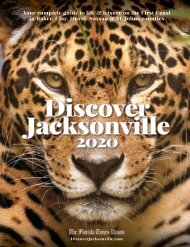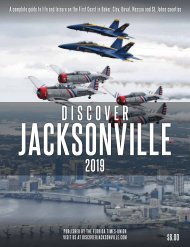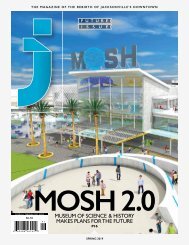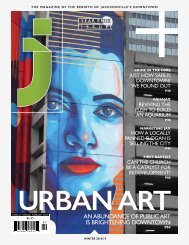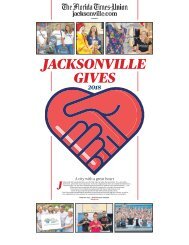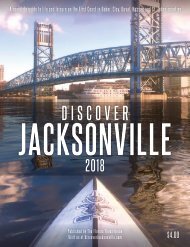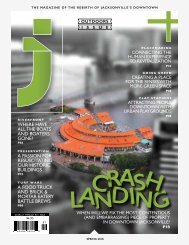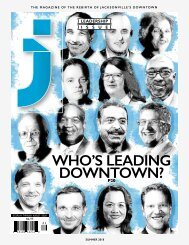J Magazine Winter 2019
Create successful ePaper yourself
Turn your PDF publications into a flip-book with our unique Google optimized e-Paper software.
Steven Frich of First Transit dusts an autonomous vehicle as Marcus Dixon of the Jacksonville Transportation Authority helps set up a display in Hemming Park.<br />
More progress<br />
The next year, JTA launched the First Coast Flyer, its premium<br />
bus rapid-transit service, speeding people to Downtown connections<br />
from the Beaches, northern neighborhoods and The Avenues<br />
Mall area, with the final route down Blanding Boulevard to Orange<br />
Park Mall coming in 2020. The buses offer free Wi-Fi and news and<br />
weather monitors. The sleek, aerodynamic Flyer vehicles are powered<br />
by cheaper, cleaner compressed natural gas (CNG).<br />
In 2016, JTA took over the Mayport ferry, the service that no one<br />
else wanted because it seemed maintenance-heavy, revenue-light<br />
and politically laden. “Everyone was, like, Nat, you lost your mind.<br />
You’re the new guy who came into town, and they’re going to saddle<br />
you with the ferry,” Ford said. But he found that fares covered<br />
50-60 percent of the cost, “better than any of the bus routes that I<br />
was running, so it’s coming closer to covering its actual cost.<br />
“I also saw that by taking responsibility for the ferry and making<br />
it work and making it a viable part of the infrastructure, it would<br />
also give JTA the opportunity to really begin the journey of looking<br />
at transportation from a holistic standpoint. So if it moves people,<br />
be it a ferry, be it an automobile, be it public transport, and scooters<br />
and bikes at some point, we think we have a role in that. Not<br />
because we need to manage it, but we need to make sure that it’s<br />
all interconnected. And it operates harmoniously.”<br />
The next interconnection Ford wanted was the Jacksonville Regional<br />
Transportation Center, tying together the Skyway, the bus<br />
system, Greyhound intercity service, a pedestrian overpass<br />
and, ultimately and ideally, more.<br />
“From a walkability standpoint,” he said, “you don’t<br />
want folks walking three or four blocks with a suitcase or<br />
whatever. You want them to have close transportation<br />
connections. That’s the only way public transportation works, having<br />
close connections from one mode to the other.”<br />
There already was a Regional Transportation Center plan when<br />
Ford arrived, but it was a $130 million to $150 million plan with a<br />
$60 million budget. He called in the planners and told them, “Give<br />
me a $60 million project. And interestingly enough, I would say the<br />
$60 million project is much more compact and iconic in design.”<br />
You can see the striking building going up on West Forsyth just<br />
north of the Prime Osborn Convention Center. It is set to open in<br />
late March or early April.<br />
All this relatively quick innovation and progress won Ford fans<br />
like Jeanne Miller, JTA board treasurer as well as president and<br />
CEO of the Jacksonville Civic Council, an influential organization<br />
of business and civic leaders.<br />
“He’s a visionary,” Miller said. “He’s very, very accomplished, a<br />
stellar example of a true expert in transportation. He has a great deal<br />
of professionalism and high standards for everyone, including himself.<br />
He has raised the standards of excellence (at JTA) in all aspects.<br />
“What Nat has brought to the entire organization is the broader<br />
view of how transportation affects the daily lives of current and<br />
future users, for example millennials … You’re carrying loved ones,<br />
you’re carrying people to their doctors’ appointments and their<br />
jobs. It’s a covenant with passengers that we will bring you from<br />
point A to point B. Transportation is an integral part of everyone’s<br />
lives, especially in Jacksonville.”<br />
Ford’s early successes also brought national recognition. In<br />
2016, Ford was named a White House Champion of Change in<br />
transportation innovation. That same year, JTA won the Outstanding<br />
Public Transportation System Achievement Award of the<br />
American Public Transportation Association. Ford became chair<br />
of that organization.<br />
WINTER <strong>2019</strong> | J MAGAZINE 25



